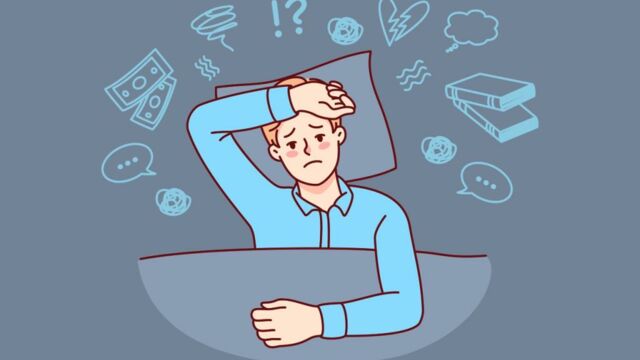Sleep: Here's how overthinking prevents you from falling asleep at night

Do you sometimes wish you could switch your brain off to fall asleep? Is your mind racing when you go to bed? Here are some tips to stop overthinking instead of falling asleep.
A common reaction to overthinking at night is to try to stop these intrusive thoughts and feelings, which might seem like a good idea at first, but can have serious consequences over time. Several people explained that their mind is racing at night, and this is completely normal. When we go to bed, our brain processes the day we have just lived. Sometimes, it likes to focus on the negative aspects of the day, which makes us anxious for the day ahead, and usually prevents us from falling asleep.
Discover our latest podcast
Overthinking does not include anxious thoughts exclusively. We can think of anything that happened today or in the past, even a few years back. Some people have said they relive conversations with friends, or arguments, and others have said they plan their entire day in detail.
More under this adMore under this ad
How does overthinking affect the way you sleep
Overthinking can be a sign of anxiety, which leads to sleep struggles. Trouble sleeping can be caused by several things, including stress, anxiety, depression, and insomnia. Professor John Groeger, lecturer in psychology and director of Sleep Well Science at Nottingham Trent University, tells Metro:
More under this adMore under this adWe can only sleep when we are sufficiently exhausted (and hence unable to worry!) or sufficiently relaxed.
Stress will delay our sleep, because we are simply too aroused to relax.More under this adMore under this ad
“Don’t overthink it, it’s not that serious”
— Maxine🍒 (@chaesoberrie) April 4, 2023
me overthinking it: pic.twitter.com/gTjFxfYpDb
Dr. Meg Arroll, a clinical psychologist who wrote Tiny Traumas: When you don't know what's wrong, but nothing feels quite right gives Metro a possible explanation for why overthinking prevents us from sleeping:
More under this adMore under this adThe stress response triggered by anxious thoughts overrides the sleep drive as it is so key for survival.
Read more:Feeling exhausted after socialising? You might have post-lockdown burnout
Anxiety makes us think we are in danger
In other words, anxiety makes us think we are in danger. Our brain is made to keep us awake in case of imminent danger. So when we lie in bed, overthinking about everything that could go wrong, it tricks our brain into thinking we are in immediate danger, and stops it from relaxing enough to go to sleep.
More under this adMore under this adIt is a vicious cycle: lack of sleep makes us more anxious, and anxiety makes it impossible to fall asleep. Severe lack of sleep can have dangerous consequences on your mental health, as John Groeger describes:
After a stressful day, and a shortened or broken night’s sleep, we will function worse. Our concentration will be poorer, our intolerance greater, and the effort we need to make will increase.More under this adMore under this ad
We will become more sensitive to, perhaps find it less easy to forgive, what we see as ‘faults’ in others, such as delays we encounter.
How exhausting it is to overthink. pic.twitter.com/H40GYeByHP
— 24.00 ➐ (@hardtoprocess) July 10, 2022
Read more:Anxiety: Here are some ways your body reacts when you're overly anxious
How to switch your brain off to sleep
One question remains: how do you break this vicious cycle? Psychology lecturer John Groeger suggests journaling, or talking to someone you trust. This can help you get rid of these difficult emotions and focus on the positive aspects of your life.
There are also things you can avoid before going to bed, such as alcohol, caffeine, and confrontational and anxiety-inducing situations. Exercising can help too, especially if it is outside and earlier in the day.
More under this adMore under this adProfessor John Groeger gives one final tip:
Above all, seek professional help and the support of those who love you.
me when i overthink about my future pic.twitter.com/I8DambokIP
— badut (@yaelahbadut) March 29, 2023
Sleepstation gives examples of tips you can use to switch off these intrusive thoughts and feelings, in a strategy called Cognitive Behavioural Therapy for insomnia (CBTi):
- Mouth a word repeatedly: mouthing a word 3 or 4 times a second takes head space, which means you don't have the mental space to think about anything else. You can repeat several things, such as the word 'the', a nonsense syllable (veep, boop, bap,...) or even a proper name such as 'Jaffa Cake'. The word must have no emotional meaning to you, and it can take a while for you to find the right word.
- Distract yourself: make up a relaxing scenario in your head such as a beach holiday, a nice dinner, or an afternoon in the garden. If you immerse yourself enough, it should be impossible to think of anything else.
- Accept your thoughts: although it seems strangely simple, this may be the most effective strategy to stop overthinking and falling asleep. Accepting your thoughts means you do not worry about their implications anymore, thus lessening your anxiety and calming your mind.
Can't even get a wink of sleep, my demons make me overthink too much.
— ...tofu. (@_tofu_tofutofu_) April 5, 2023
Read more:These zodiac signs overthink the most
Sources used:
Metro: Why your brain keeps overthinking at night - and how to switch it off
Sleepstation: Can’t sleep? Overthinking? How thought blocking can help